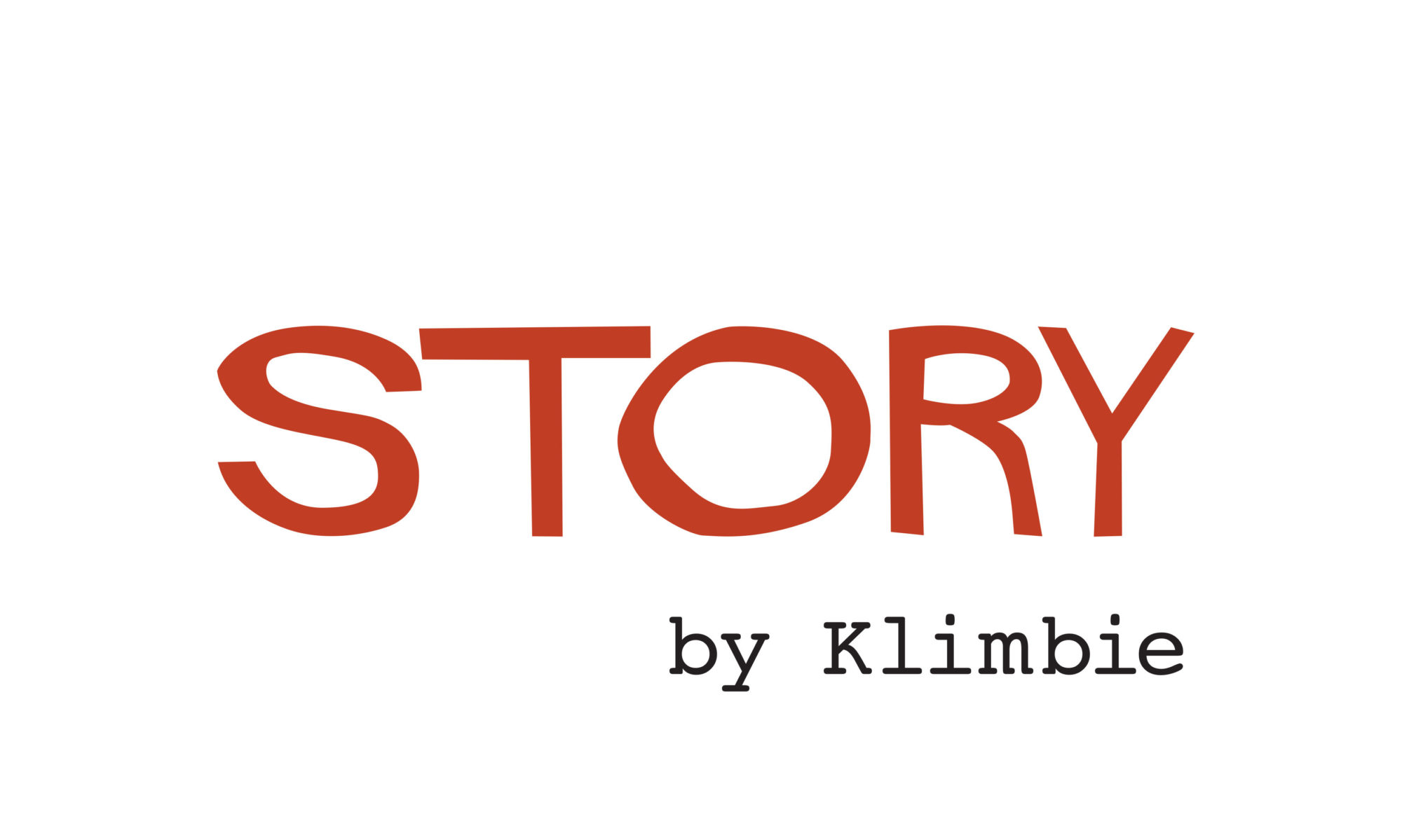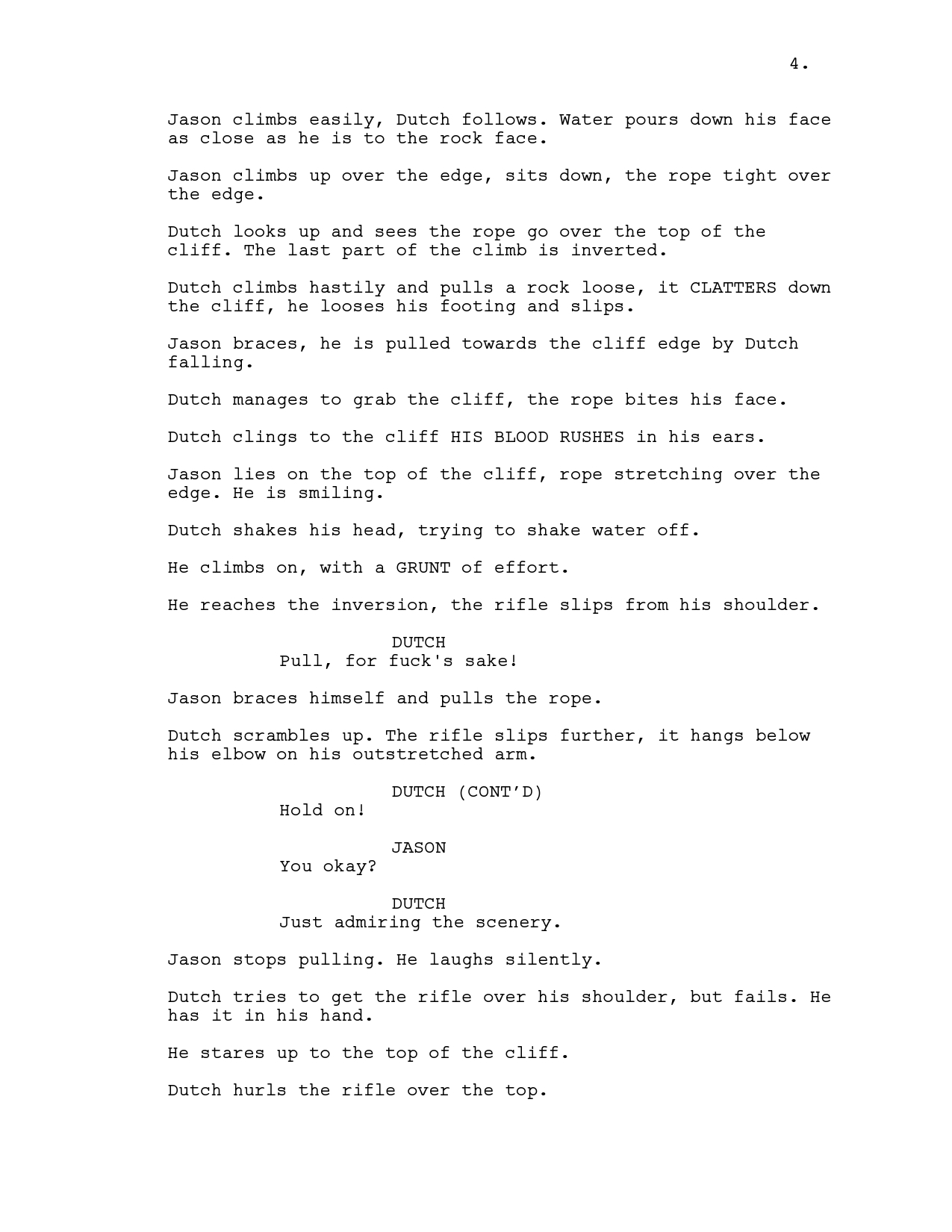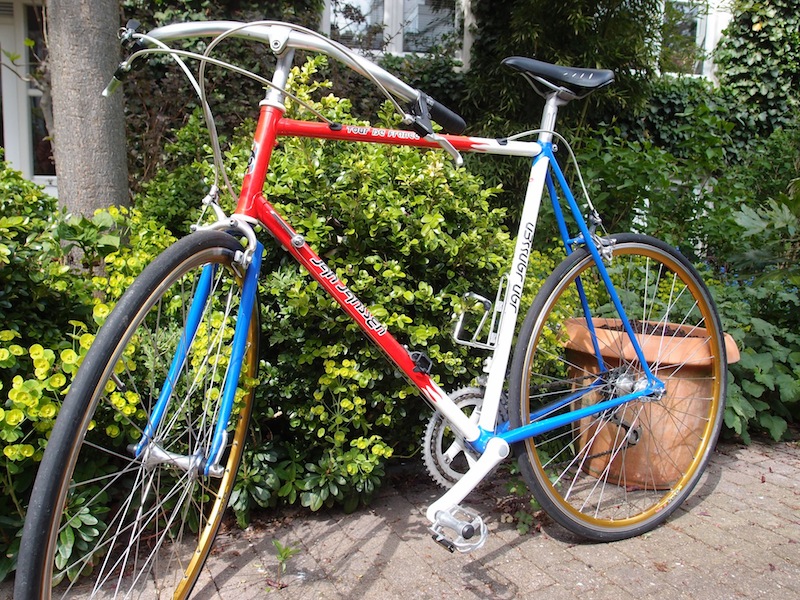Hier een klein voorproefje uit het scenario voor de korte film “Pain du Croquet” die ik voor June te Spenke schreef, gebaseerd op een anekdote uit haar leven. June hoopt deze zomer te filmen, met Gaithe Jansen en Lisa Smit in de hoofdrollen!!

DVD’s lurking in your closet
If there is something..
…at the back of your DVD cabinet you haven’t watched, perhaps you should. For example when you are laid up with a frightfully sore back, as I am currently. Just for your pleasure, here’s what I watched:
BLACK SHEEP (2006)
Lurking around the back of my DVD cabinet was this New Zealand horror spoof. Two hours of quite well plotted meat eating sheep gone wild. Stunning vistas of sweeping countryside and a rather mixed bag of acting. The sheep did well though. As usual for this genre the backstories are quite thin but fun. Plenty of gore – for those who like that stuff – and thank god – it doesn’t take itself too seriously. All in all, quite watchable, especially when doused with painkillers.
FLASHBACKS OF A FOOL (2008)
Bought this DVD because the central plot resembles a project I am working on. Or so I thought. A movie essentially about childhood lost and yearning for how things might have been. Bookended by a stunningly solid performance by Daniel Craig as Joe, a washed up Hollywood star but intersected by a much weaker central part – the flashback to his youth. We are led to believe that the flashback will be mainly about some sort of break up between Joe and his childhood friend “Boots” – only it isn’t. I felt a distinct lack of dramatic impetus in the middle part. Special mention must go out to Felicity Jones, as the “Young Ruth” – a beautiful actress with bucketloads of talent.
But more than once the movie begged the question: what am I actually watching? Then, as the film returns to present day it becomes forceful again. The star of this movie is, however, undoubtedly “If there is Something” by Roxy Music. The movie itself is stylish but muddled.
VIDOCQ (2001)
This one’s been on the shelf a really long time. And after seeing it, it didn’t deserve that fate. Gerard Depardieu in a forceful role as the famous French detective. Reasonably exciting and shot in typical 90’s wild /camera / full close up (look ma, it’s MTV!!) style. This was a very early entry in the field of widespread use of CGI, SD and HD digital cameras and so forth. It carried me along succesfully enough to the grande finale which was a classic detective “drawing room reveal” – without the drawing room, it must be said. Quite dark and disturbing along the way too. Worth your while, if you’re into steampunk, retro sci fi etc.
Hi everyone
This is my website. As you can plainly see, it’s not finished yet. More soon. Samples of screenplays, movie reviews and lots of other good stuff.
En dan in het Nederlands: er wordt hard gewerkt aan deze site. Voorlopig kan je genieten van de 14 columns die ik voor de Volkskrant schreef tijdens mijn verblijf in Hollywood in 2010 – 2011. Meer volgt!
Cowboys & Cheerleaders
After working through the night to get his paper done, in order to be able to join Suzanne on spring break, Charles learns that eccentric Prof. Tidesdale isn’t exactly impressed by his academic achievements. In this scene Charles is both encouraged and discouraged to actually go on the LARP, setting up the first act break decision which occurs a bit later.
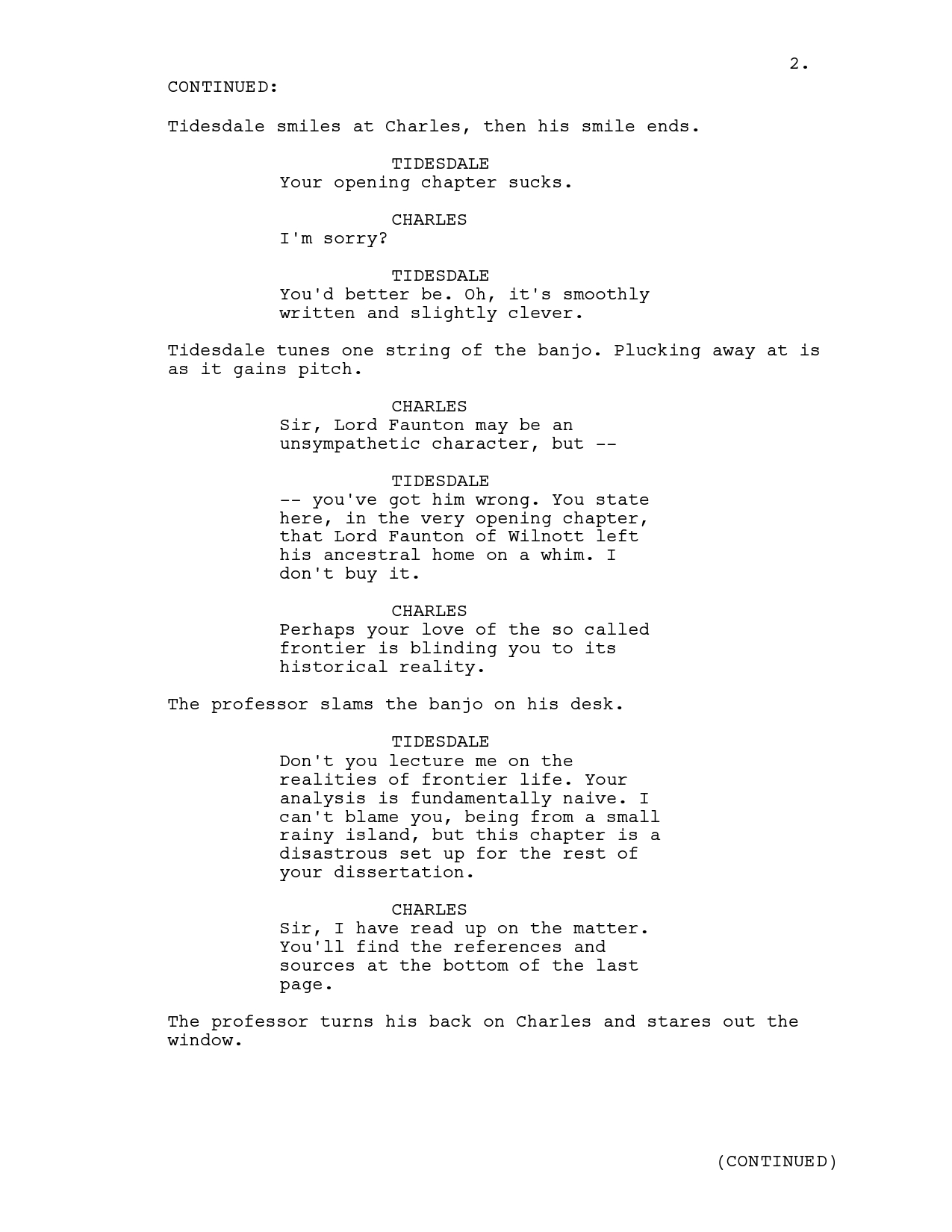

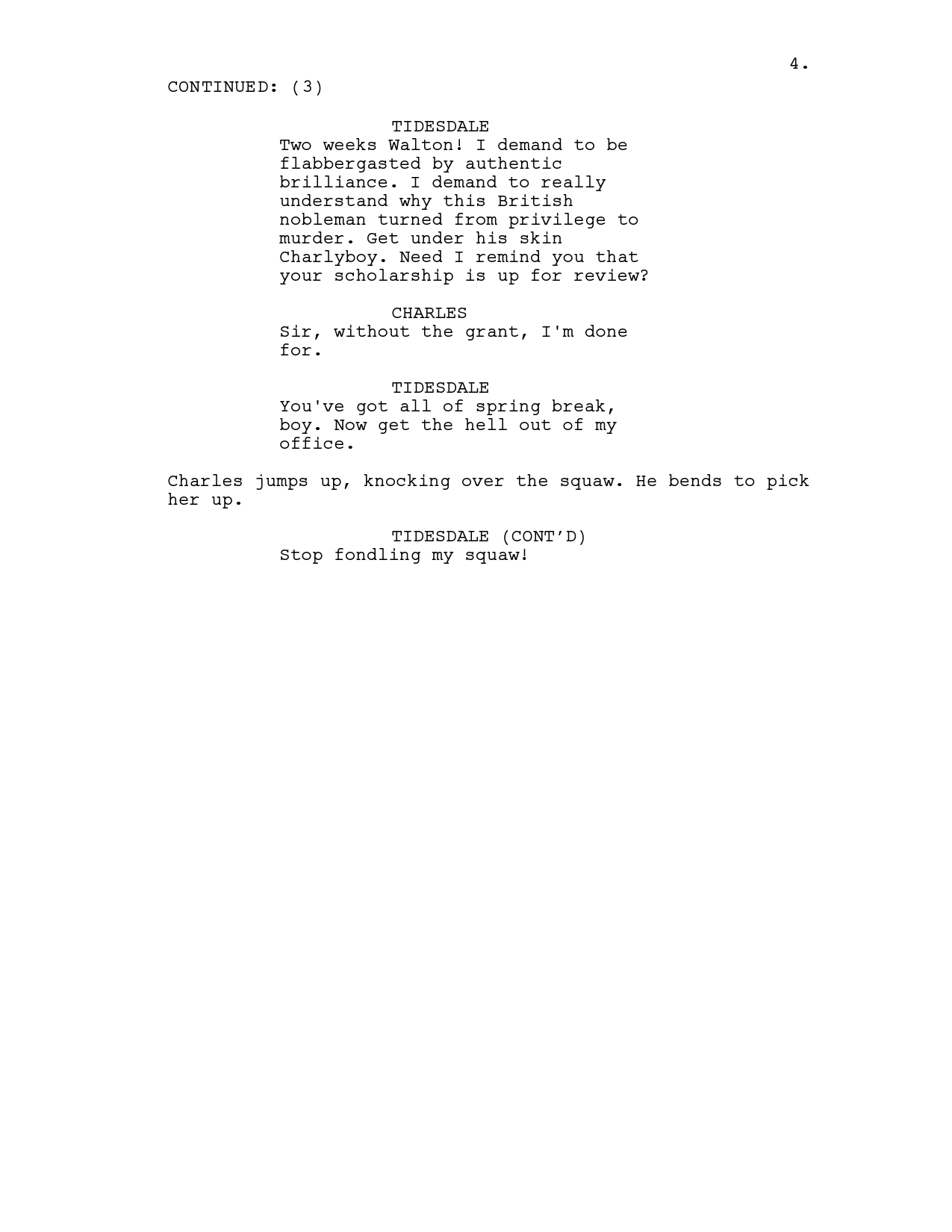
Social Network – unlikable characters
A widely held assumption on successful film is that the lead character of a movie should be likable. However this is not always the case. In both “Catfish” and “The Social Network”, the lead character will doubtless be found unsympathetic by many people. Yet those same people may also find the films quite good. This begs the question of whether a lead character should indeed always be likable?
There are many films, and also TV series, in which the lead character is unsympathetic. The German film “Der Untergang” is a biopic on Adolf Hitler’s final days in Berlin in 1945 – in which Hitler is very much the lead character and in no way sympathetic. In “Gran Torino” Clint Eastwood plays a grumpy bigot. In the hit series Mad Men ad exec Don Draper is a philandering, arrogant man – though he clearly has a lot of charisma. In Entourage, Vince Chance, the nominal lead character is a lazy, dimwitted actor who always lands on his feet and/or atop some gorgeous girl, but perhaps finding him unsympathetic betrays some degree of jealousy on my part!
What compels us to watch the adventures of characters we wouldn’t choose to have a beer with on Friday night? Maybe it is precisely their character flaws that make it an interesting experience, perhaps it is the fact that the film will enlighten us in some way about such unpleasant characters that draws us in. Furthermore, it may be that in such flaws we see our own faults, albeit enlarged. Let’s go back to the two films that were set.
In the documentary Catfish we follow a rather glib and self satisfied young man, Nev Schulman, on a journey of discovery. We see him both mocking and developing genuine feelings for a Facebook family and especially the daughter of that family, Megan. By the end of the film we know that Megan does not exist and that Nev has been bamboozled by a rather sad 40 year old woman. I will confess to a certain amount of pleasure in seeing the smug Schulman so fooled. Especially the scene where Schulman fantasises about taking Megan’s virginity in classic high school jock mode, sets him up nicely for the collapse of the entire fantasy. Perhaps the film might have been more effective if Schulman had been a nicer person. That may have made his initial infatuation more touching, and that might have made the viewer more involved in his shock at the discovery of the fraud. Finally I don’t think that the makers intended us to find Schulman unsympathetic. The whole film reeks of the smugness of Schulman himself, as it is very much a family affair. However, his gentlemanly acceptance of the hoax, and his delicate handling of its perpetrator shows us that he is not really a bad guy, nor are his collaborators. In this he does finally become quite sympathetic.
In The Social Network we see (fictionalised) Facebook founder Mark Zuckerburg bring his great creation to life. But there is a Frankenstein element to both the end product and the way Zuckerberg achieves his goal. For the purposes of this paper, I have a problem. Despite his obvious flaws, I found Zuckerberg quite likable. He reminded me of myself and even more of some of my closest friends – which may reflect poorly on me….But
I understand that most people may find him annoying to the extreme. But his character defects tie in directly to his quest. He lacks basic social skills and wants desperately to fit in. From this stems his mission and he pursues it, although it doesn’t bring the rewards he wants, because he never addresses his true problems but works only on a artificial solution: Facebook. This clear mission and his way of solving it makes enthralling viewing.
He is, through all his quirks and ambition a very interesting character to watch, and we care what happens to him and those around him. The script gives him many sharp, clever comebacks and some really good wisecracks. Furthermore the “good guys” are a truly annoying bunch, from his whimpering co-founder to the over the top prep boy twins.
For those who really find him unpalatable there is the consolation that in the end he is all alone, the man who connected 500 million people has no real friends himself.
So there we have in a nutshell the conclusion of the question of whether a character should be likable. The answer is no. They do not have to be likable in the sense that we would want give them a hug, or invite them to our birthday party. We do, however, have to care what happens to them. This may seem contradictory but it is not. A believable character, equipped with both flaws and (some)redeeming features, with an understandable dilemma or challenge. That should lead us to want to know where his or her story is headed. It does help if some slightly sympathetic lines or actions are slipped in, to give us a glimpse of what could be or could have been. It may be precisely that we want to see arrogance humbled, or unkindness cured. Or just to see that no amount of success can lead to happiness for those who betray their few friends. Or perhaps even that evil simply wins in the end, as the Coen brothers wanted us to conclude in “No Country for Old Men”. Redemption is not even a necessity – solid believable character and a clear quest should suffice – and that is hard enough.
Murder of Crows
King’s Speech – a buddy movie
Without question The King’s Speech is an excellent film. Great performances in a fast paced story with high stakes makes for compelling viewing. But it all starts, of course, with the writing. Someone said to me: “I heard the script was pretty good too.” In the following I hope to briefly examine particular strong points of the screenplay of The King’s Speech, starting with the structure.
The script is unremarkable in it’s classicism. It adheres strictly to the basic 3 act structure rules. What is surprising is that it also adheres to the “rules” of the buddy movie. The uneasy first meeting, the unequal social stature of the buddy’s, the initial rejection of the friendship by the top dog, grudging acceptance, growing friendship, the break up, the period apart – pining for reunion (first by the one – without success, then the other), the reconciliation, a threatening blindside (the outside world threatens to break up the repaired friendship) and finally the true and equal friendship that is the climax of the film.
This choice of form allowed David Seidler to turn an interesting side note in history into an enthralling personal tale. He keeps the story we are watching small, whilst letting the larger historical stakes (kingship, the looming war) shine through enough to lend our two heroes quest urgency. Yet it is always the success or failure of the friendship that is the central stake for the main characters. For me at least, King George’s failure to do the radio speech would have had as gravest consequence (in the context of the film) the final destruction of his friendship with Lionel Logue. Instead, his success leads to the final bonding of their friendship – which was then to last a lifetime.
The screenplay has further strengths. The passage of time is dealt with very efficiently. The story spans a vast number of years, from 1925 – 1939. We are taken from one era to the next by important dramatic occurrences, which makes for smooth transitions and keeps the tempo high. Which is important in a film essentially about talking.
Also, the writing is on many occasions very funny – although it never descends into slapstick. This makes the growing friendship believable and both main characters likeable.
On a critical note: some of the dialogue is very on the nose. The scene where the king ridicules his son springs to mind. At least it serves the purpose of explaining the rules of the world we inhabit in the film but a bit more subtlety would have been welcome.
Finally, David Seidler is said to have invented much of what happened in the therapeutic sessions. Only during filming did the grandson of Lionel Logue hand over a vast horde of treatment notes made by the therapist. The grandson later remarked that the script already matched the notes very accurately. A good imagination and sound understanding of human psychology can recreate historical fact.
All in all, the screenplay is indeed well constructed and written and thankfully was well filmed. Making “The King’s Speech” a buddy movie to be remembered!
Voor de NOS camera
“en wat is je grootste angst?”
“mijn grootste angst, tja, ik denk, dat ik….”
“STOP! Just a sec, we have to change the angle a bit”
Deze laatste spreker is een Amerikaanse cameraman. Ik word namelijk geïnterviewd door Eelco Bosch van Rosenthal, correspondent van ons hoogsteigen NOS journaal.
En nee, het is niet het sluitstuk van een terugkerende wensdroom over het winnen van mijn eerste Oscar. De NOS maakt een item over de Holland Hollywood Connection, een netwerkorganisatie die is opgezet door het Nederlandse consulaat in San Francisco. Voor Hollywood nieuwelingen bieden zij kans op een mentorschap van een geslaagde Hollywood Hollander.
Ik was al steevast van plan mij daarvoor aan te melden, maar eerlijk gezegd is het er nog niet van gekomen. Het staat zogezegd op het lijstje, tussen het internet regelen voor mijn appartement en een goedkope bioscoop vinden.
Maar zij vinden mij eerst. Op het moment dat het interview gehouden moet worden ben ik toevallig de meest kersvers gearriveerde Nederlander met Hollywood dromen.
Het is erg vreemd om tegenover Eelco te zitten en vragen te beantwoorden over mijn ambities en hoe ik denk dat allemaal waar te maken. Ik krijg er van tevoren al een behoorlijke maagzweer van. Het maakt nogmaals duidelijk dat ik nog bar weinig bereikt heb. De andere spreker in het interview is Paul Verhoeven. Helaas worden we niet op dezelfde plek geïnterviewd, anders had ik hem wat tips kunnen vragen, nietwaar?
Een deel van het interview vindt plaats in een ouderwetse wasserette. Ik doe er letterlijk mijn eerste was in LA. Geen idee hoe ‘t werkt. Omdat we in Koreatown filmen waar men Koreaans spreekt of Spaans, kan ik ook aan niemand hulp vragen. Op beeld staat nu de typische schrijver met twee linkerhanden, zwetend, vallend kleingeld, afgezakte bril en veel te veel wasmiddel in de machine. Het is een mooie metafoor voor mijn avontuur hier. Om die metafoor dan maar gelijk door te trekken: met de was is het uiteindelijk helemaal goedgekomen!
Het interview heeft alvast twee noemenswaardige effecten. Ten eerste doet het mijn naamsbekendheid bepaald geen kwaad, ten tweede ben ik als een dolle aan het werk gegaan. Bladzijde volgt bladzijde en ik ben nu daadwerkelijk schrijver in Hollywood. Het item over de Holland Hollywood Connection wordt rond 5 november door de NOS uitgezonden ter gelegenheid van de kick off bijeenkomst van de netwerkorganisatie in Nederland.
3 november 2010
